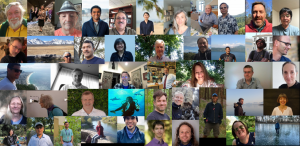Event dates: Monday 7 June 2021 – Friday 11 June 2021, virtual meeting
- The science sessions: a mix of pre-recorded oral presentations and posters with online discussion forums (similar to the meeting last year).
- The reports from the agencies: via a slide-deck made available to participants and there will be an online discussion forum for questions.
- The task teams made their reports in oral presentations to real time video-conference meetings:
- Opening and closing sessions were in real time.
- For the course of the meeting GHRSST had a virtual room based at wonder.me where colleagues could meet up at any time and move between small group video conversations.
Thank you to the entire GHRSST team for making this meeting so interesting!

Resources
- Proceedings including agenda: GHRSST Project Office. (2021). Proceedings 22nd international GHRSST Science Team Meeting (2021). Zenodo. https://doi.org/10.5281/zenodo.5750123
- Access to Moodle: https://training.eumetsat.int/course/view.php?id=406
- Science sessions: Highlights and abstracts are contained in the proceedings. Oral presentations can be downloaded from: https://training.eumetsat.int/mod/page/view.php?id=14678 Posters are on the Padlet: https://padlet.com/TrainingEUMETSAT/el4plfma88e4a1t
- Recordings of the real-time meetings:
Monday 7 June 2021: Opening Session and Task Teams 1, See recording
- Virtual Café at wonderme: https://www.wonder.me/r?id=573aab5a-8365-42c4-9a60-0a83cf5475cd
- Zoom session recordings: https://training.eumetsat.int/mod/page/view.php?id=14678
Science Sessions
Science Session 1: Challenging Regions – The Coast and The Arctic
Moodle: https://training.eumetsat.int/course/view.php?id=406
Presentations:
- Jacob Høyer – Development of consistent surface temperature retrieval algorithms for the sea surface, marginal ice zone and sea ice in the polar regions
- Emmanuelle Autret – Introducing the ISRO-CNES TRISHNA mission for high resolution SST observations in coastal ocean and continental waters
- Thomas Lavergne – Status and plans for the sea-ice concentration data records from the EUMETSAT OSI SAF and ESA CCI: possibilities for polar SST products
- David S. Wethey – SST at 70-m scale from ecostress on the space station: application to complex coasts and intertidal flats
Download the slides: https://training.eumetsat.int/mod/folder/view.php?id=14061
Access the recordings: https://training.eumetsat.int/mod/book/view.php?id=14071&chapterid=628
Poster session: https://padlet.com/TrainingEUMETSAT/el4plfma88e4a1t
Science Session 2: Applying The Data: Spatio-Temporal Variation; Extreme Events
Moodle: https://training.eumetsat.int/course/view.php?id=406
Presentations:
- Peter Minett – Studying the thermal skin layer using thermofluorescent dyes
- Peter Cornillon – Instrument Noise, Retrieval Issues or Geophysical Signal?
- J Xavier Prochaska – Deep Learning of Sea Surface Temperature Patterns to Identify Ocean Extremes
- Francesca Leonelli – Detection and Characterisation of Marine Heat Waves in the Mediterranean Sea in the past 40 years
Download the slides: https://training.eumetsat.int/mod/folder/view.php?id=14070
Access the recordings: https://training.eumetsat.int/mod/book/view.php?id=14071&chapterid=626
Poster session: https://padlet.com/TrainingEUMETSAT/2dltnpeni8e9mzed
Science Session 3: Calibration, Validation and Product Assessment
Moodle: https://training.eumetsat.int/course/view.php?id=406
Presentations:
- Alexey Kaplan – Use Of ESA CCI SST Analysis To Validate Sampling And Measurement Error Models For SST From Ships
- Bingkun Luo – Saharan dust effects on North Atlantic sea surface skin temperatures
- Haifeng Zhang – A completeness and complementarity analysis of the data sources in iQuam
- Werenfrid Wimmer – Uncertainty validation of shipborne radiometers
Download the slides: https://training.eumetsat.int/mod/folder/view.php?id=14077
Access the recordings: https://training.eumetsat.int/mod/book/view.php?id=14071&chapterid=630
Poster session: https://padlet.com/TrainingEUMETSAT/klmswuubrmqcj0pg
Science Session 4: Algorithms
Moodle: https://training.eumetsat.int/course/view.php?id=406
Presentations:
- Owen Embury – Developments towards a 40-year climate data record from the ESA Climate Change Initiative
- Chris Merchant – Bias-aware optimal estimation for sea surface temperatures from historic AVHRRs
- Andrea Pisano – A New Operational Mediterranean Diurnal Optimally Interpolated SST Product within the Copernicus Marine Service
- Rishi K Gangwar – Optimal Estimation of SST from INSAT-3D/3DR Imagers
Download the slides: https://training.eumetsat.int/mod/folder/view.php?id=14083
Access the recordings: https://training.eumetsat.int/mod/book/view.php?id=14071&chapterid=629
Poster session: https://padlet.com/TrainingEUMETSAT/37erohxscv59r8dy
Science Session 5: Computing and Products
Moodle: https://training.eumetsat.int/course/view.php?id=406
Presentations:
- Olafur Jonasson – First Evaluation of the Diurnal Cycle in the ACSPO Global Super-Collated SST from Low Earth Orbiting Satellites (L3S-LEO)
- Xu Li – The Sea Surface Temperature analysis in the NCEP GFS and the future NCEP UFS
- Wen-Hao Li – PODAAC milestone: GHRSST data migrating to AWS Cloud
- Ed Armstrong – Analysis Ready Data applications for GHRSST and related data
- Chelle Gentemann – Science Storms the Cloud
Download the slides: https://training.eumetsat.int/mod/folder/view.php?id=14089
Access the recordings: https://training.eumetsat.int/mod/book/view.php?id=14071&chapterid=627
Poster session: https://padlet.com/TrainingEUMETSAT/46oseukzvpio7s0m
Agency News
Agency reports Slide-Deck: https://training.eumetsat.int/pluginfile.php/43941/mod_resource/content/3/Agency-Slidedeck-GHRSST_2021.pdf
GHRSST connections to CEOS SST-VChttps://training.eumetsat.int/pluginfile.php/41464/mod_resource/content/6/GHRSST_CEOS_SSTVC_connections-Ed_Armstrong-GHRSST_2021.pdf
Task Team Reporting
- Climatology and L4 Inter-Comparison (IC)
- Evolution of the Regional/Global Task Sharing (R/G TS)
- Coral Heat Stress User SST Requirements (Coral)
- Feature Fidelity (F2T2)
- Climate Data Assessment Framework (CDAF)
- Shipborne Radiometry (ISFRN)
- High Latitude SST (HLSST)
- Single Sensor Error Statistics and L4 (SSESL4)
- Matchup Database Standards (MDB)
- Cloud Masking (CMT2)
- HRSST Drifters for Satellite SST Validation (HRSST)
Priorities for GHRSST
- Panel A (Jacob Høyer, Marouan Bouali, Christo Whittle, Chris Merchant): What progress is GHRSST making with regard to the user priorities on Observational Needs for SST as set out in the Ocean Obs 19 white paper [https://doi.org/10.3389/fmars.2019.00420] e.g. Arctic, coastal, feature resolution? What still needs to be done?
- Panel B (Tony McNally, Xu Li, Helen Beggs, Simon Good): What are the needs of coupled ocean atmosphere NWP for satellite SST and how can GHRSST contribute to this?
- Panel C (Ken Casey, Ed Armstrong, Chunxue Yang, Misako Kachi, Jean-François Piollé): (1) What progress has been made in GHRSST to consider Artificial Intelligence / Machine Learning techniques and applications, and what more can be done? (2) How can GHRSST better promote open science and open data not only in the SST community but also for related ocean and atmospheric measurements? Are there things we can do in our community to improve the sharing of results besides publications?
Link to discussion forum: https://training.eumetsat.int/mod/forum/view.php?id=14647
G-XXII Feedback and Future ST Meetings Discussion
https://training.eumetsat.int/mod/forum/view.php?id=14649
Closing session
Download the slides: https://training.eumetsat.int/mod/folder/view.php?id=14690
Actions for GHRSST 2021 and closing remarks
